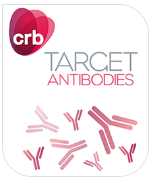
The choice to use a peptide or a recombinant protein as the antigen to raise an antibody can be a difficult decision. Here we have outlined the main points to consider in making your choice easier.
Recombinant proteins can have high success rates
Using a recombinant protein for your antigen has many advantages, it provides more epitopes for antibodies to be raised against and is also likely to maintain more of the native conformation of the protein as compared to a peptide. For this reason, antibodies raised against recombinant proteins can often be more straight-forward to produce and have higher success rates. We offer several antibodies which have been raised against recombinant proteins in our DISCOVERY antibodies catalogue including: Anti-crc antibody, anti-SUMO1 antibody, anti-OTULIN antibody, anti-p12 antibody and anti-PERK antibody, all of which have excellent signals with low background.
On the other hand, this increased number of epitopes can sometimes result in more background signal due to off-target binding which may cause problems in downstream applications. However, perhaps the main disadvantage to recombinant proteins is the availability and difficulty in producing them. Generating a recombinant protein can be time consuming and expensive and some proteins even when produced at sufficient titre can be poorly soluble and precipitate or aggregate which can result in low titres in immunisation protocols.
Recombinant proteins may also be unsuitable for detecting one member of a closely related family of proteins resulting in an antibody which will likely cross-react with other proteins. Therefore, if target selectivity is your goal, there are many situations in which a peptide is the best choice.
Peptides can be used to make highly specific targeted antibodies.
Synthetic peptides can be used to make antibodies that can detect a small specific region of a protein, for example, the only non-conserved region of the target protein in a closely related family of proteins, or even to specifically detect a post translational modification (PTM) such as with anti-2SC antibody or anti-citrullinated α-Enolase antibody.
Here at CRB we have an excellent success rate in raising antibodies to recognise PTMs, gained from our years of expertise and our dedication to each project ensuring the best possible outcomes. We have also raised mutant specific antibodies that are highly specific, for example, anti-Histone H3 (G34R) antibody which recognises glycine to arginine substitution mutation of histone variant H3.3 with high specificity. H3.3 G34R is a mutation associated with certain cancers including paediatric high-grade glioblastoma (HGG). We have also used peptides to raise antibodies which detect specific isoforms of a protein, such as Anti-FGFR2c and FGFR2b antibodies.
As well as being essential for certain circumstances, peptides also have the advantage that they are quick and easy to synthesise and we can start the project immediately. All of our peptides are synthesised in house, allowing us to ensure the highest quality for this essential part of the antibody generation process. However, peptides also have their challenges and can in some cases be hard to elicit an immune response against. In a straightforward case, and with a bit of luck with the protein sequence we can mitigate many of these problems by selecting a highly antigenic peptide which is soluble and the desired length, we do this using our in-house antigenic prediction service carried out by our highly experienced immunology team.
References:
Nicole Trier et al.,(2019). Peptides, Antibodies, Peptide Antibodies and More. Int J Mol Sci. 20(24): 6289. PMID: 31847088

